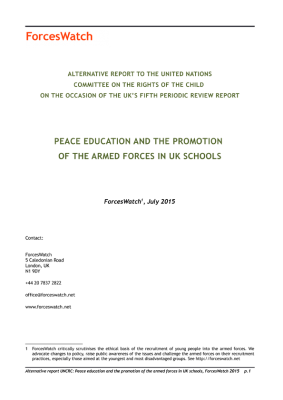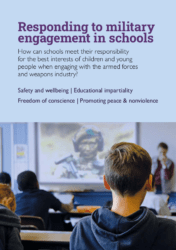Peace education and the promotion of the armed forces in UK schools

Alternative report to the United Nations Committee on the Rights of the Child on the Occasion of the UK’s fifth periodic review report
This report highlights that peace education is not being promoted in schools. This is counter to the recommendations made by the United Nations Committee on the Rights of the Child to the UK Government that peace education should be part of the curriculum.
This raises concerns particularly with the increased promotion of the military within schools through the Department for Education’s ‘military ethos’ programme and free military-related learning resources, and as the armed forces continue to conduct a substantial ‘youth engagement’ programme.
Executive summary
Peace education is not being promoted in schools by the UK Government and is not a part of the education curriculum. This raises concerns particularly as the UK Government is increasing the promotion of the military within schools through the Department for Education’s ‘military ethos’ in schools programme and free military-related learning resources, and as the armed forces continue to conduct a substantial ‘youth engagement’ programme that involves many thousands of visits to schools annually. This is counter to the aims of education as set out in the UN Convention on the Rights of the Child (the Convention), the recommendations given by the Committee on the Rights of the Child (CRC) to the UK Government and the content of CRC General Comment No. 1 that specifies that education must promote non-violence in school and ensure that children have the skills to resolve conflicts in a non-violent manner.
This report focuses on:
- The absence of a compulsory and organised curriculum of peace education within UK schools.
- The increased promotion of the military within the educational system by the Government and by the armed forces.
- Concerns regarding this activity taking place within education, including the process of recruitment to the armed forces.
This report concludes that none of the relevant recommendations made by the CRC in 2008 have been implemented by the UK Government. Not only is peace education not promoted but learning resources in support of the military are emphasised above others by the Department for Education. Schools and colleges form a significant part of the armed forces awareness-raising and recruitment process, providing direct access to students without the oversight of parents or guardians. Schools in disadvantaged parts of the UK are more likely to be visited by the armed forces and are actively targeted by the military ethos programme.
A significant development since the 2008 Concluding Observations of the CRC, is the Department for Education’s ‘military ethos’ programmes, which structurally integrates a military presence within parts of the education system, making it difficult for certain students to avoid significant exposure to the influence of the military on their education.
We therefore conclude that none of the CRC’s recommendations from 2008 referenced in the Background section of this report have been implemented by the UK Government.
ForcesWatch strongly recommends that:
- The UK Government should take immediate steps to implement the recommendations given by CRC in their Concluding Observations of 2008 and 2002 regarding peace education, human rights education and the recruitment of children into the armed forces.
- The UK Government should consult civil society on the peace education initiatives they have developed for schools so as to incorporate peace education into all curriculum at a primary and secondary level and at teacher training institutes.
- The UK Government should provide free peace education and human rights education resources to schools which have been developed in collaboration with civil society. This would balance the distribution of free resources about the armed forces which have been offered to schools.
- The UK Government and armed forces should refrain from recruitment-related activities within education.
- The UK Government should refrain from promoting military-related materials within schools that present a one-sided view of military activity. If such materials are promoted, schools should be provided with balancing materials and guidelines for how to approach the topic.
- The UK Government should ensure that parents are consulted about military-related activities that are part of their children’s education.
- The UK Government should ensure that the education system is not used to target children from low-income areas for military recruitment.
- The UK Government should instigate a thorough inquiry to scrutinise its policies of promoting military ethos in schools.
Also see this Guardian article about the report

